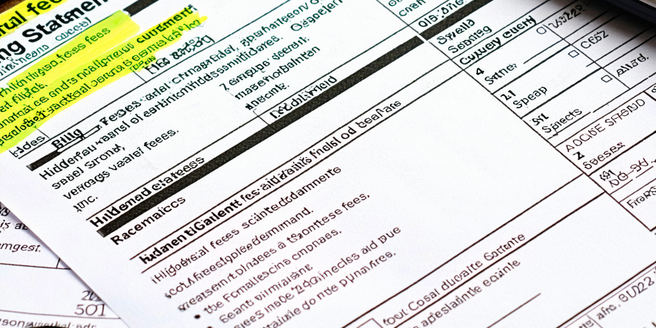
Understanding the Common Types of Unauthorized Fees
Unauthorized fees can take various forms and understanding them is essential to protecting your finances. Some common types include hidden administrative charges, which may appear in service agreements, and automatic renewal fees you may not have intended to continue. Be wary of dynamic pricing strategies where fees are adjusted based on perceived willingness to pay. Transaction fees that aren’t clearly communicated in the terms and conditions are also prevalent culprits. Additionally, be on the lookout for penalties and surcharges that may not have been specified when you initially agreed to a service. By thoroughly scrutinizing agreements and asking clarifying questions before committing to any service or product, you can catch these unauthorized charges before they impact you financially.
Signs That Indicate You’re Being Overcharged
Various red flags can indicate you’re being overcharged. One common sign is a recurring discrepancy between the initial quoted price and the final billed amount; inconsistency in billing is often a telltale sign. If your statement features vague descriptions that are hard to clarify, consider them as indicators of potentially unauthorized charges. Unexpected fees appearing on your financial statements with little explanation, and lacking corresponding services or purchases, can signal overcharging. Also, a notable increase in bills without an accompanying increase in service scope or quality should raise suspicion. Regularly performing audits on your accounts and comparing charges against agreed-upon terms are vital practices to detect and address overcharges promptly before they result in significant financial loss.
Steps to Review and Verify Your Financial Statements
Reviewing and verifying financial statements is an integral part of ensuring financial accuracy and transparency. Begin by gathering all relevant documents, including invoices, bank statements, and receipts, to ensure you have a complete record. Carefully compare these documents against your financial statements to identify any discrepancies or unauthorized charges. Pay attention to dates, amounts, and transaction descriptions, ensuring each aligns with your records. If you find errors, document them and reach out to the responsible party for clarification or correction. Setting aside dedicated time each month to review your statements not only helps catch errors early but also aids in understanding your spending habits and financial standing. Regular audits empower you to maintain control over your financial health and avoid unexpected fee surprises.
How to Dispute Unauthorized Charges Successfully
Successfully disputing unauthorized charges requires preparation and diligence. Start by gathering evidence, including receipts, emails, and any correspondences that demonstrate the charge is incorrect. Contact the merchant or service provider to discuss the discrepancy first, as it might be a simple error that they can resolve. If the issue is not resolved, escalate your complaint to your bank or credit card provider, presenting your evidence clearly. Most financial institutions have a specific process for disputing charges, so adhere to their guidelines closely. Record all interactions and follow up persistently until the issue is resolved. By taking a systematic approach, you enhance the likelihood of successfully reversing the charge and protecting your financial interests.
Preventative Measures to Avoid Future Fee Surprises
To safeguard against future unauthorized charges, adopt proactive measures. Start by thoroughly reading all terms and conditions before agreeing to any service, looking out for hidden fees or clauses. Set up alerts for your bank or credit card accounts to monitor transactions in real time; these alerts can spot unexpected activities immediately. Consider using financial management tools to track your spending and highlight irregularities. Regularly update your financial knowledge by reading about emerging scams and fee-related regulations. Lastly, maintaining a line of communication with your financial institutions can help you preempt suspicious activities and gain quick assistance when needed. Staying informed and vigilant is your best defense against fee surprises.
Legal Rights and Resources for Fee Discrepancies
Understanding your legal rights is crucial for dealing with fee discrepancies effectively. Consumer protection laws often provide frameworks to dispute unauthorized charges and demand accountability. Familiarize yourself with relevant laws and provisions like the Fair Credit Billing Act, which allows you to dispute inaccuracies on credit card bills. Access resources such as legal aid services or consumer protection agencies that can offer guidance and support. Many governmental and non-governmental organizations have dedicated hotlines or websites offering information on handling fee disputes. Staying informed about your rights not only empowers you to act in your best interest but also discourages entities from imposing unauthorized fees, knowing consumers are knowledgeable and prepared to protect their financial wellbeing.
